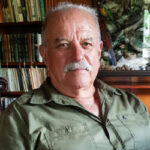Who is one of the most admired public figures in Australia today? John Howard, Tony Abbott? No. To pursue that line would make this into a comedy piece. It’s Peter Cosgrove.
Army commander during the Vietnam War, leader of the INTERFET mission that supervised the East Timorese transition to independence, taskforce leader of the rebuild program after Cyclone Larry, and then Governor-General. Overall a nice guy and a great worker for Australia.
With all those accomplishments dancing before her eyes, ABC 7:30 host Leigh Sales wrapped some questions about the war crimes in Afghanistan in velvet and respectfully handed them to Cosgrove.
There are two parts of Cosgrove’s CV that need square bracketing. He was Chief of Army when John Howard ordered the first wave of Special Forces into Afghanistan on 22 October 2001 to help establish the forward operating base (Camp Rhino) south-west of Kandahar in November 2001 and then help capture Kandahar Airport the following month.
In other words, Cosgrove was in the moment when the Afghanistan occupation started. He was the Army’s most senior decision maker. When Howard whistled up the second horseman of the Apocalypse what role did Cosgrove play then? As Chief of Army was he Howard’s knife sharpener? Or did his INTERFET experiences kick in and did he try to act as a calm centre of moderation?
On Cosgrove’s watch, at the tail end of his stint as army chief, the first death occurred. Andrew Russell was killed when his patrol vehicle hit a land mine on 16 February. Russell was the first Special Air Service trooper to die on active duty since Vietnam. What was Cosgrove’s response? Was it: “Soldiers die in war” or did Russell’s death cause a great foreboding that we were over our head in Afghanistan and should get out? Another question that lives for eternity in the cemetery of unanswered responses.
For the first two years of the war Cosgrove, as army chief, was accountable. And we have not heard from him yet on that score.
Cosgrove’s talents were recognised and in 2002 he became Chief of the Defence Force. He was the supreme service commander for the next three years of the Afghanistan War. In December 2002 Special Services left Afghanistan and did not return until September 2005. He oversaw the “nice” part of the war. It was left to others when the war turned very nasty and war crimes started to be reported.
Notwithstanding, for a third of the war, Cosgrove was boss cocky or lesser boss cocky. Decisions he made or contributed to would set the theme for what was to come. He needs to talk to us about this.
But this won’t happen, as we saw on 7.30. Now that he is one of Australia’s secular saints his warrior days are over. “We want to know if there are ways to fix the [war crimes] problem,” he told Leigh Sales. “We.” He is part of us now and doesn’t really know any more than we do about what happened in Afghanistan.
Cosgrove: “Some of the people who have been swept up in [the Brereton Inquiry into war crimes] have had multiple deployments [to Afghanistan]. Were there ways of not sending the same people so often?”
Sales: “What do you think?”
Cosgrove: “I don’t know. I’m going to wait to see what the justice [Brereton] says.”
After running the show for five years, Cosgrove does not know.
Does he know that Major-General Gilmore and Major-General McOwan, both Special Services supreme commanders during the Afghanistan War, were asked formally and informally whether the tempo and impact of operations in Afghanistan could be sustained? On every occasion they advised that they could.
Ben Roberts-Smith, who won a Victoria Cross in Afghanistan and is a person of interest to the Brereton inquiry, had four tours. He was there for a total of 30 months. Publicly, Cosgrove doesn’t know what that rate of deployment does to a man.
In the weeks and months ahead, thanks in part to the Walkley-grade reporting by ABC Investigation, more will become known of the war crimes committed in Afghanistan by our Special Forces. Let’s hope 7.30 does a better job of taking the game up to those accountable than Sales did this week.
We look forward to interviews with the current Governor-General David Hurley and former Air Chief Marshall Angus Houston. Both were chiefs of the Defence Force in the Afghanistan war. This was the bad period when most of the alleged war crimes were committed. They have a lot to tell us.




